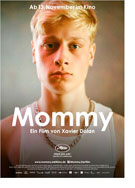

Opening 13 Nov 2014
Directed by:
Xavier Dolan
Writing credits:
Xavier Dolan
Principal actors:
Anne Dorval, Antoine-Olivier Pilon, Suzanne Clément, Patrick Huard, Alexandre Goyette
Mommy directed by the 25-year-old French Canadian, Xavier Dolan, is an intense, innovative, fast moving and character driven film. From the beginning moments, when we meet the titular mother, Die (Diane), played masterfully by Ann Dorval, our attention is captured emotionally and physically. In an opening scene we see Die driving to pick up her obnoxious but charming son, Steve, brilliantly played by Antonie-Oliver Pilon, who has been discharged from a detention home for setting a fire, which seriously burned one of the other boys. Die, who is widowed, often jobless, dresses like a teenager and acts like it sometimes, too, is faced with the task of raising her ADHD aggressive son. He swears, he fights, he gets touchy with women, but when calm he is sweet natured and even comforting. The movie is like a roller coaster ride, a juxtaposition between scenes of aggression, sometimes violent and scenes of joyous highs, often tender. For example, one minute they are gleefully dancing to the pop music of the ninety’s and soon after they are violently fighting because Die asks Steve if the Mommy-engraved necklace he gave her is stolen.
Interestingly enough, Dolan said himself in an interview in the Hamburger Abendblatt, “My characters fight in order to exist. This is a story of a mother-son relationship that is full of rough, raw love—sometimes exhibiting itself in the form of tender moments and sometime in rage and disappointment. They love each other more than anything else but the social circumstances and Steve’s illness make it difficult for them to make it work.” In addition, Dolan states that his lead character, Steve, has quite a bit in common with himself and that he also used to settle conflicts with his fists.
Deftly, Dolan adds a third character to this mother-son duo. This character is their neighbor, Kyla, played by the beautifully understated Suzanne Clément. Kyla is a shy, introverted teacher, who probably had a nervous breakdown in the past, which caused a stuttering speech impediment. She is Die’s opposite and when she decides to give Steve home schooling, she not only brings a calming influence into the mother-son relationship, but she also begins to liberate herself from her own inhibitions.
Dolan’s use of artistic flourishes, such as with the music and camera stunts, amplifies the emotional intensity of the film. The wonderful scene where the radio music from the ‘90s accompanies the spontaneous, heartfelt dancing in the kitchen gives the three main characters as well as the audience the exuberant feeling of dancing their troubles away. Dolan’s use of a 1:1 aspect ratio with black bars on each side through most of the film conveys a feeling of claustrophobia, a feeling of being bottled in. Twice in the film the characters are able to break out of their boxes, when Dolan employs the widescreen; for example, in an especially liberating moment, when Steve skateboards down the middle of the street singing and lifting his hands in euphoria. Some people found these camera effects silly or as the Germans say, kitschig, but since I tend to be more of an emotional, spontaneous person, I consider it to have added to the dynamics of the film. It makes the characters come alive and gives you an uplifting feeling that in spite of all the problems and obstacles, there is still hope.
As I see it, the movie does have one or two small flaws or incongruities, which either do not seem to fit or leave one in the dark. For example, the beginning scene, which shows a title card that speaks of a fictional new law in Canada that allows parents to place their children in institutions without any legal proceedings, is, in my opinion, superfluous and can easily be left out without changing anything in the movie. In addition, the mystery around Kyla’s relation or better said “non-relation” to her daughter and husband bothered me at first, but in another light, developing this relationship might have taken away from the two main characters and their problems.
Mommy takes us up and down the scale of emotions and in the end leaves us emotionally exhausted but instilled with Dolan’s love of life and hope that things can change for the better. The three central actors were the vehicles to conveying this message and their brilliant performances made Dolan’s characters come vividly alive. This is definitely one of the best movies this year. Don’t miss it. (Karen Schollemann)